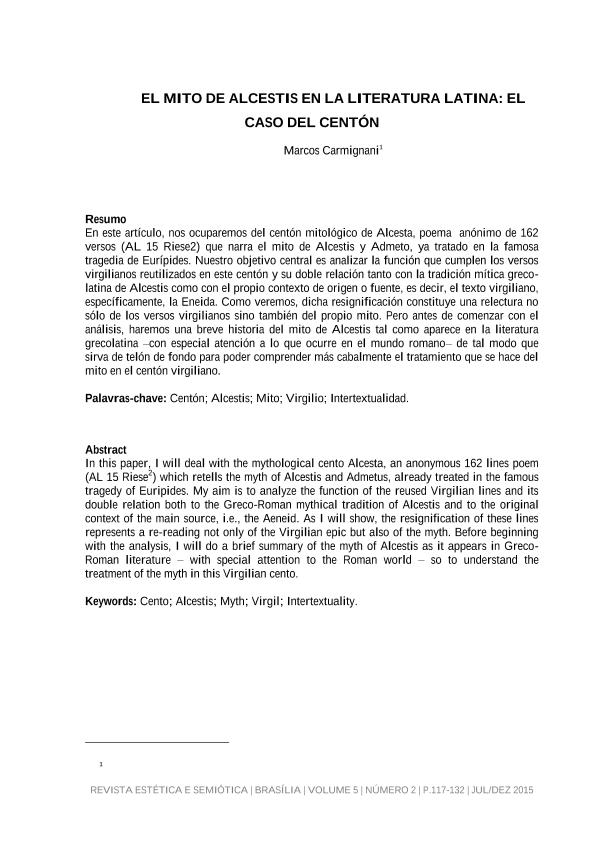Mostrar el registro sencillo del ítem
dc.contributor.author
Carmignani, Marcos Flavio

dc.date.available
2019-02-06T20:53:11Z
dc.date.issued
2015-12
dc.identifier.citation
Carmignani, Marcos Flavio; El mito de Alcestis en la literatura latina: el caso del Centón; Universidade de Brasília. Faculdade de Arquitetura e Urbanismo; Revista de Estética e Semiótica; 5; 2; 12-2015; 117-132
dc.identifier.issn
2238-362X
dc.identifier.uri
http://hdl.handle.net/11336/69602
dc.description.abstract
En este artículo, nos ocuparemos del centón mitológico de Alcesta, poema anónimo de 162 versos (AL 15 Riese2) que narra el mito de Alcestis y Admeto, ya tratado en la famosa tragedia de Eurípides. Nuestro objetivo central es analizar la función que cumplen los versos virgilianos reutilizados en este centón y su doble relación tanto con la tradición mítica grecolatina de Alcestis como con el propio contexto de origen o fuente, es decir, el texto virgiliano, específicamente, la Eneida. Como veremos, dicha resignificación constituye una relectura no sólo de los versos virgilianos sino también del propio mito. Pero antes de comenzar con el análisis, haremos una breve historia del mito de Alcestis tal como aparece en la literatura grecolatina –con especial atención a lo que ocurre en el mundo romano– de tal modo que sirva de telón de fondo para poder comprender más cabalmente el tratamiento que se hace del mito en el centón virgiliano.
dc.description.abstract
In this paper, I will deal with the mythological cento Alcesta, an anonymous 162 lines poem (AL 15 Riese2 ) which retells the myth of Alcestis and Admetus, already treated in the famous tragedy of Euripides. My aim is to analyze the function of the reused Virgilian lines and its double relation both to the Greco-Roman mythical tradition of Alcestis and to the original context of the main source, i.e., the Aeneid. As I will show, the resignification of these lines represents a re-reading not only of the Virgilian epic but also of the myth. Before beginning with the analysis, I will do a brief summary of the myth of Alcestis as it appears in GrecoRoman literature – with special attention to the Roman world – so to understand the treatment of the myth in this Virgilian cento.
dc.format
application/pdf
dc.language.iso
spa
dc.publisher
Universidade de Brasília. Faculdade de Arquitetura e Urbanismo
dc.rights
info:eu-repo/semantics/openAccess
dc.rights.uri
https://creativecommons.org/licenses/by-nc-sa/2.5/ar/
dc.subject
Centon
dc.subject
Alcesta
dc.subject
Literatura Latina
dc.subject.classification
Estudios Generales del Lenguaje

dc.subject.classification
Lengua y Literatura

dc.subject.classification
HUMANIDADES

dc.title
El mito de Alcestis en la literatura latina: el caso del Centón
dc.type
info:eu-repo/semantics/article
dc.type
info:ar-repo/semantics/artículo
dc.type
info:eu-repo/semantics/publishedVersion
dc.date.updated
2018-09-24T14:30:34Z
dc.journal.volume
5
dc.journal.number
2
dc.journal.pagination
117-132
dc.journal.pais
Brasil

dc.description.fil
Fil: Carmignani, Marcos Flavio. Consejo Nacional de Investigaciones Científicas y Técnicas. Centro Científico Tecnológico Conicet - Córdoba. Instituto de Humanidades. Universidad Nacional de Córdoba. Instituto de Humanidades; Argentina
dc.journal.title
Revista de Estética e Semiótica
dc.relation.alternativeid
info:eu-repo/semantics/altIdentifier/url/http://periodicos.unb.br/index.php/esteticaesemiotica/article/view/12008
Archivos asociados
